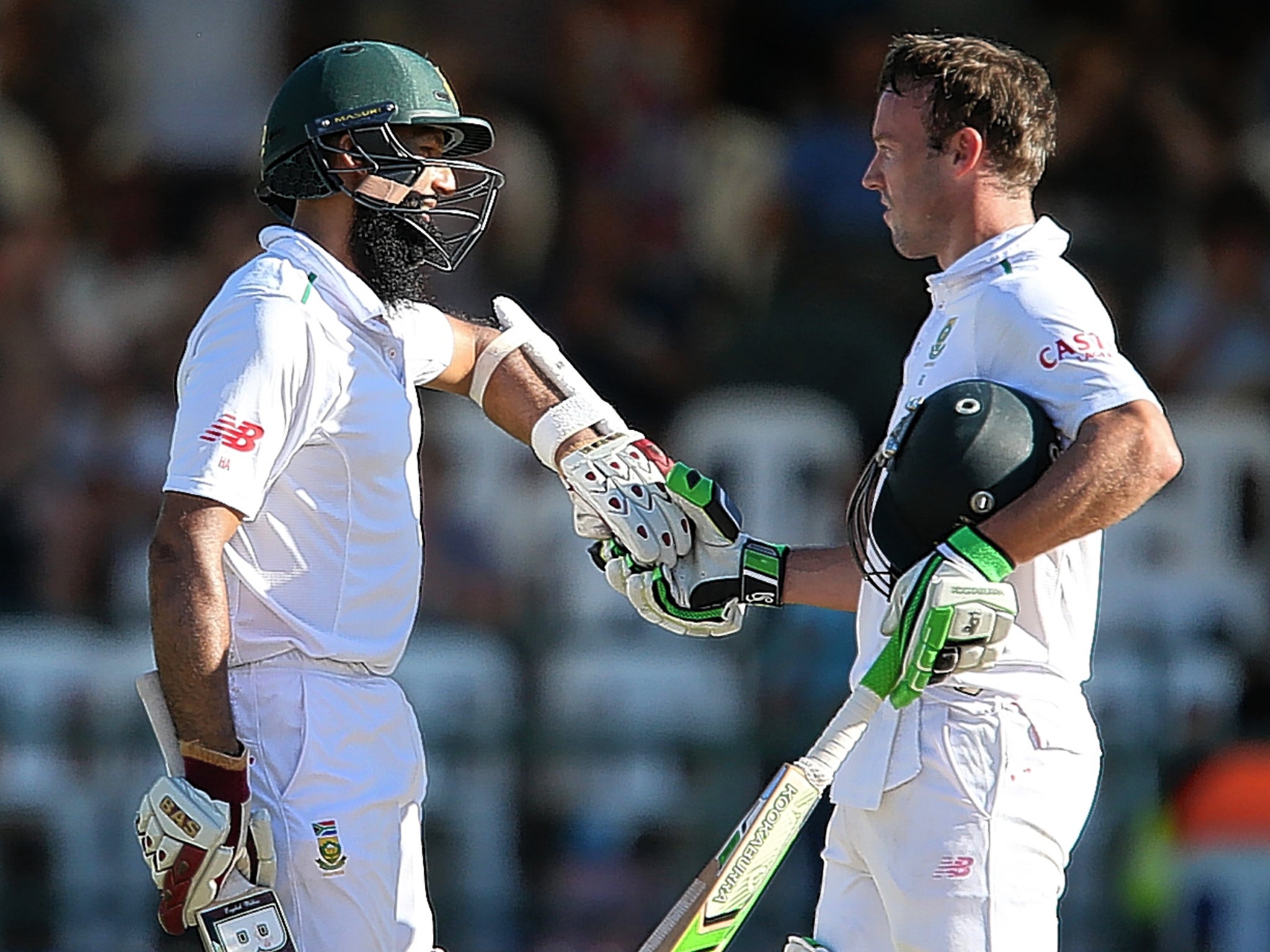AB De Villiers may change mindset but not result
New captain has a more typically South African attitude but in-form England remain favourites

When a captain chooses to quit in mid-series it is impossible to believe that all is well with his team. In most ways, such a move appears to play into opponents’ hands, especially those of opponents who are 1-0 up and could now have you on the run.
The timing of Hashim Amla’s departure, which has stunned a nation, seems bizarre. Amla had returned to form in the Second Test with a handsome double hundred after a long fallow period and South Africa secured a fighting draw.
Although they were under the cosh, as applied by Ben Stokes and Jonny Bairstow in the first half of the match, they exhibited their traditional dogged qualities in abundance as the contest went on.
But as soon as it was over, Amla walked. He went suggesting that he knew he was not the man for the job. If a captain believes that, the ship may be sinking beneath him. The country at large was shocked by it, although Amla had been subject to vitriolic derision for months.
Yet it is noticeable that England are hardly rubbing their hands with glee. There is a widespread feeling in their camp that Amla got it right, that it was the selectors who were wrong to appoint him in the first place and that AB de Villiers, his successor, is exactly what the Proteas need right now.
One of the England party who played in the resounding victory in Durban, Chris Woakes, spotted the opposition’s dilemma in that match. Amla by then might have been captain in name only.
“I’m not 100 per cent sure how much of a huge difference Amla stepping down is going to make,” said Woakes, speaking yesterday on behalf of Waitrose, England’s team sponsors. “Even when I was batting at Durban, albeit not for very long, you could feel that Amla probably wasn’t leading the side as much as a normal captain would, for instance like Alastair Cook does.
“It felt like AB was having an input anyway. So I’m not sure how much difference that’s going to make. Everyone leads their team in a different manner. But it’s not a surprise, I suppose, that he’s stepped down. But he’s an incredible batsman, as he showed in the last Test match.”
England can expect a much more obviously in-your-face approach from South Africa now, a style that probably suits their reputation much more. Amla was quiet and studious and, while De Villiers in no way lacks those qualities, he will bring a belligerence and aggression aimed at undermining England.
The tourists will certainly know they are in a contest and they will be able to hear it most of the time. The Wanderers in Johannesburg, where the Third Test of four starts on Thursday, may be an ideal place to start as it has a fearsome reputation, epitomising as it does a perception of South African manhood.
It is known familiarly as the Bullring, partly because of its design and partly because of its menacing atmosphere. All of South Africa’s opponents know that the intention will be to intimidate them from the moment they start the long walk through the enclosed tunnel towards the pitch.
There is an undoubted national pride in this. But, for all that, the results reveal that it does not always work in their favour. Since South Africa re-entered international cricket in 1992 they have won 10 and lost eight of the matches played at the Wanderers, their worst loss ratio at home. On the other hand they may be buttressed by the fact that two of their biggest three victories have been by an innings against England. But it begs the question: how would they fare if it were not for the intimidation factor?
Sir Ian Botham spoke genially to a group of reporters the other day and was quite adamant that England are on top in this series and that they should relish playing at the Wanderers, high altitude and all.
“I’m not worried about the Wanderers, I’d actually be looking forward to playing on it if I was a bowler,” he said. “Bowling up there – carry, swing, bounce – that’s what you want, so I’d be very happy there and I think we have the armoury to deal with that.
“Steve Finn has bowled exceptionally well, he has been the pick of the seamers, certainly in the last game,” Botham added. “Jimmy Anderson is back, he will be fitter and stronger, he’s got a nice 10-day break now. Stuart Broad’s bowling well, the whole line-up, batting to 10 and you have Jimmy at 11 who’s got a 90 in Test cricket. It’s a strong set-up and I think it will be one that’s far too strong for South Africa.”
Much is being made by home pundits over South Africa ending the Second Test in the stronger position. Some are even referring to it as a winning draw, which is to put a romantic gloss on events. Botham, while not dismissive of them, sees only one winner.
“South Africa will be a lot happier now than they were after Durban,” he said. “But when you look man for man and mark them out of 10, then we win by quite a distance.”
The return of Dale Steyn for South Africa – if he returns – may make a difference. But if the tourists can hold their nerve in Johannesburg, their batting dovetails properly and they manage to avoid shelling catches, as they did with such profligacy in Cape Town, they can secure their 11th Test series win in this country.
Join our commenting forum
Join thought-provoking conversations, follow other Independent readers and see their replies
Comments
Bookmark popover
Removed from bookmarks